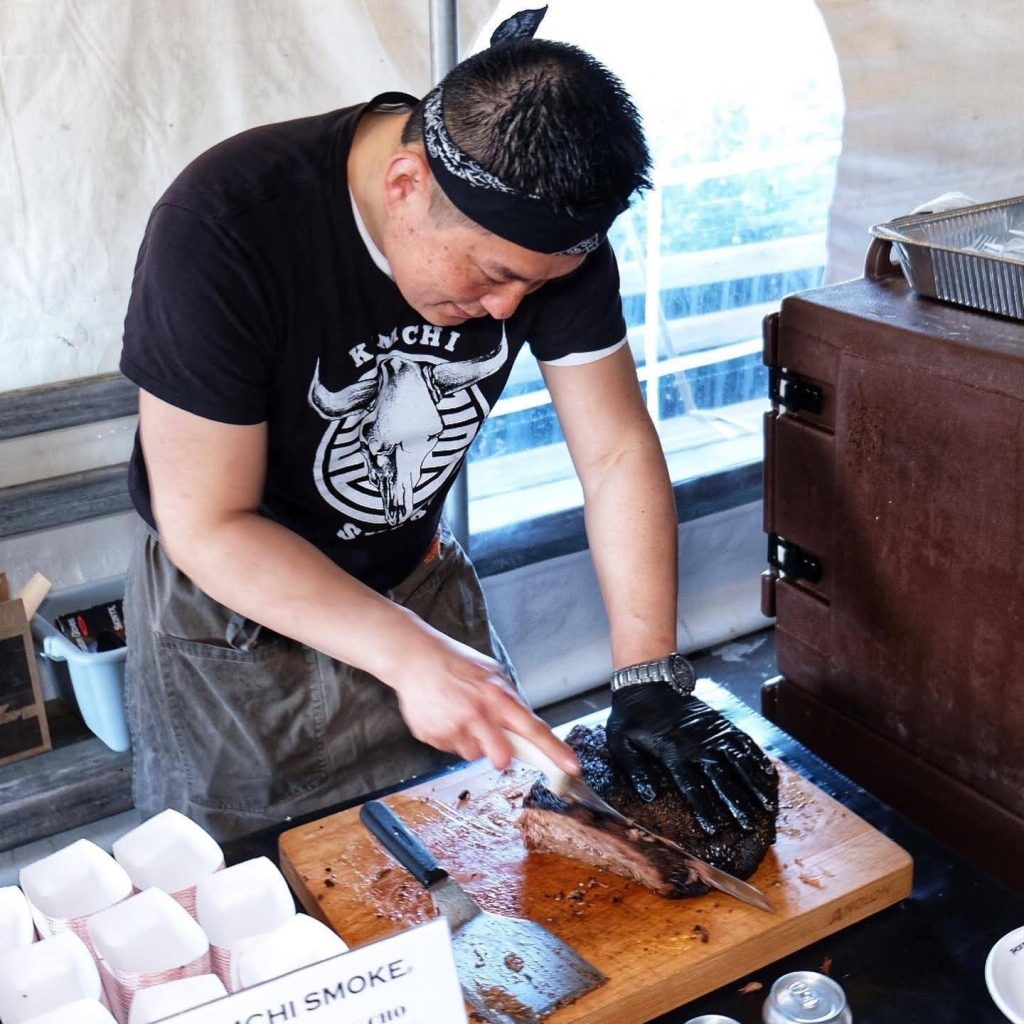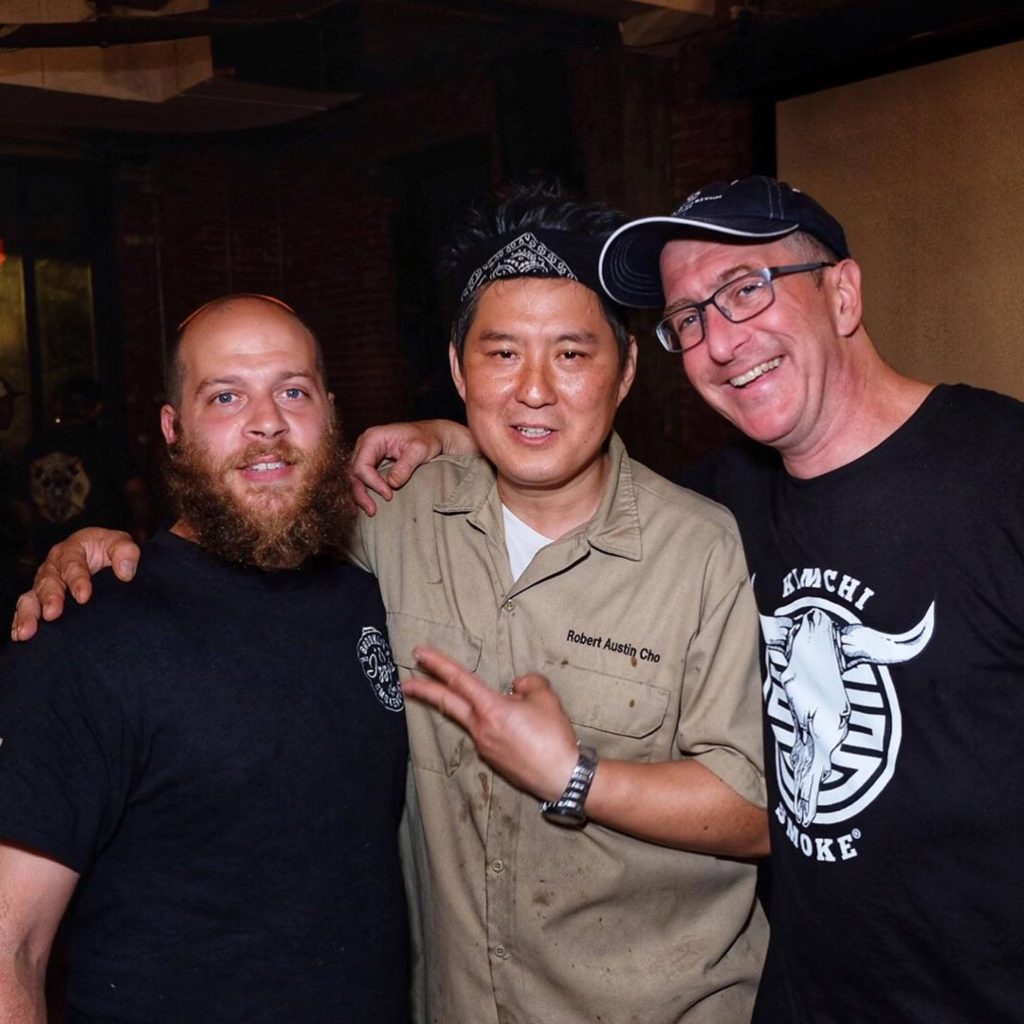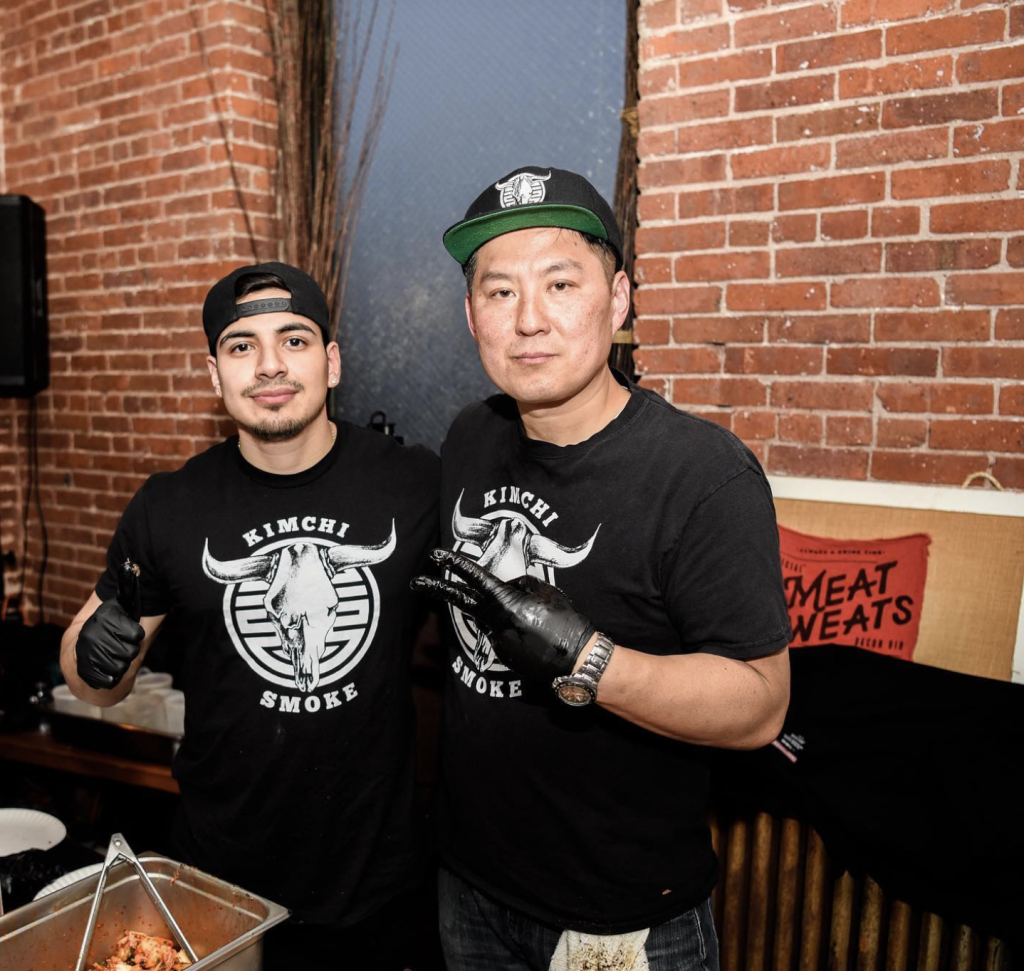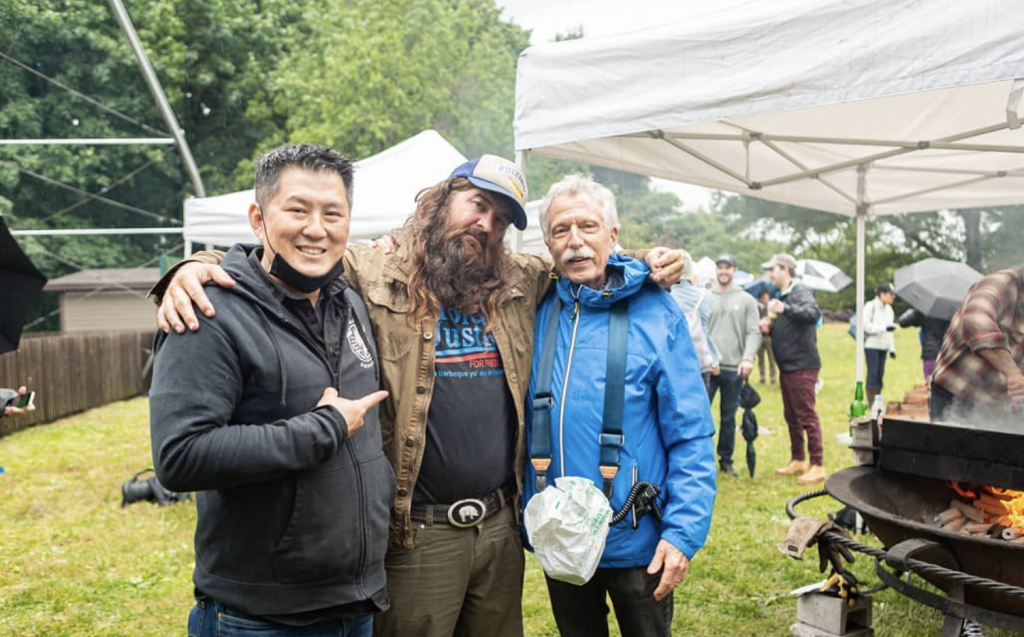Born in Seoul, raised in Jersey and grew from the influences of Texas, chef Robert Austin Cho and his BBQ at Kimchi Smoke simply refuse to be boxed into any region. He breaks down boundaries and definitions by marrying everything on the menu from Chonut to Chominican rice, while adding to them a uniquely Korean flavor profile. This journey in the food world has also been a surprising way for him to reconnect with his Korean heritage and receive acceptance as an American.

(Photo courtesy of Robert Austin Cho)
Food Karma: Tell us more about yourself and your chef career!
Chef Robert Austin Cho: I’m Robert Austin Cho. I’m the chef, pitmaster and owner of Kimchi Smoke. Currently I have two locations in Westwood and Ridgewood, New Jersey, but it all started out as a pop up in 2013. I don’t have a formal chef training, but some time in the mid 2000s, I was watching TV and seeing BBQ, smoked meat, all that, blew my mind! I instantly gravitated toward it.
Living in an apartment at that time, I bought a small grill, went to the park and just started smoking some ribs. And I thought I got pretty good at it! It was just a hobby at the time — I didn’t try to sell it, just do it more and more. I would go out to eat at BBQ restaurants, read about places. And after a while, I thought “I can make food like these people,” why not give it a shot?
FK: And was there anyone aiding your aim while you were giving it a shot with Kimchi Smoke?
RAC: I didn’t have an official mentor figure, but Aaron Franklin was on TV at the time becoming a household name. He’s a guy that I studied a lot — watched all his videos, anything about him I would read and see what he was doing — because I wanted to perfect my brisket like he did.
I also read a cooking book, “Smoke & Pickles” by chef Edward Lee. His story resonated with me since he’s Korean-American, raised in New York then decided to move down South and became influenced by Southern cuisine. His words definitely gave me a lot of inspiration and guidance throughout my career.
Over the years, I watched a lot of Food Network and saw a lot of great people, but the first one I saw was Bobby Flay, and then I got to meet him and then competed with him on his show, which was pretty cool. Chef Carl Ruiz came into my restaurant once and we became friends. We spoke at Pig Island 2019 right before he passed. I looked up to him as a chef and a Jersey guy. The way he ran social media definitely influenced me to be more of myself. He gave me great advice and sadly, we lost him way too soon.
FK: Apart from these influential people, were there any other inspirations, like your family or close friends?
RAC: One thing that I’m very proud of is because I’m Korean-American, I believe Koreans in particular have a very good palate. That might be coming from our parents because they’re very picky. If something’s slightly too salty or spicy, or too sweet, that would really bother me. That was the foundation of my flavor profile. So I incorporated that type of standard into my food and in a sense, it’s Korean BBQ or Korean food because of how well-balanced it is.
People also ask me if the recipes are family recipes. My parents did not teach me how to cook but when I look back, since they were always working and I’m home by myself a lot, I just ended up cooking things for myself as a mode of survival. And that’s also how Kimchi Smoke came to be because there was always kimchi in the house and I would just slab them over frozen pizzas or leftovers — that’s the way I ate things.
And that’s the weird thing, because I was always ashamed to be Korean growing up, but I just love Korean food!

FK: How did those mixed feelings play a part in your upbringing?
RAC: So I was born in South Korea, came to the States when I was 4 years old — I’ve been here pretty much all my life. Growing up here at a time when there weren’t so many Asian-Americans going to school, maybe five kids in the whole school. I always felt like I was one of two Asian kids in my class, or even the whole grade, so I just wanted to fit in.
I was shying away from my ethnic background, embarrassed to be Korean at times. When we go to the beach, my parents would bring kimchi and smelly food while I just want to eat hamburgers and hot dogs. When I started doing Kimchi Smoke, it was healing. It wasn’t my goal to do it as healing but as I was doing Kimchi Smoke and promoting Korean food, meeting all different people, it was great!
It’s also because growing up, I was considered too American by some Koreans, and not American enough for Americans. I felt accepted by neither but as people accepted my food as BBQ, I felt acceptance of me as an American. Which is why I’m trying to make my BBQ just BBQ — I don’t even have to say this is Texas Korean BBQ or any other label there is.
FK: And has the unique naming of your dishes, like Chonut, Cholent or Chominican rice, helped you a lot with this?
RAC: Yes, for sure! It’s breaking down barriers in people’s minds about what type of food they are having and what it’s supposed to taste like. But it’s also two-fold. My name just somehow magically goes with a lot of things, and when I’m doing a hashtag on social media, if I put “Cho” in front of something, no one else is gonna have that. This is for marketing as anyone can easily search for my dishes on social media.

FK: Has your Korean heritage ever been an obstacle on your way to become a pitmaster?
RAC: When I did my first BBQ competition in 2013, when I showed up with my banner that said “Kimchi Smoke,” I could feel the racial overtone. It feels like I’m on a middle-school basketball court again, being picked last because “he’s Chinese, he can’t play basketball.” It felt like I was going against the grain, definitely.
But now it’s 2022, I know the sport of BBQ has changed a lot, there are a lot of different chains and different styles of BBQ-ing. It is definitely changing, but when I first started out I did feel like an outsider at times. And when I didn’t get invitations to festivals or competitions, I do wonder, because there usually aren’t a lot of people of different ethnicities at those as well.
And I’m from Jersey, so it’s like a double-disrespect. So I’m always working hard and bringing my A-game to events like Rib King or Brisket King, because I’m representing Korean flavors, I’m representing Jersey. In 2019 when I won People’s Choice in Brisket King, it was for Jersey, because I know it doesn’t get the respect that it deserves. And I feel really good this year too because the SmoKING of Meats won and he’s from Jersey too!

FK: And how did you feel being a part of those past Food Karma events?
RAC: I guess, prior to 2019, there were three years that I’ve done it and a part of me felt that I had no chance of winning, because I was nobody. But I always thought, I love what I do and my meat is just as good as anyone’s there. And I’ve gone around tasting other’s briskets and ribs — which tasted really good — and I know I’m in the big league now. But I’m always going in thinking I’m the underdog, I have to work hard and bring my A-game, and go represent.
The crowds at these events are also great, and that’s the reason I keep coming back. It’s definitely exciting just to be there slicing the meat and watching people taste it, especially with their reactions afterward. The people are the most important to me, and that is why I’m so proud of my People’s Choice award, because ultimately it’s the people that are coming to the restaurant and supporting my food.
FK: Are you coming back next year?
RAC: I think about that a lot actually. In the past, I always thought I’m not gonna do it again, but then I always ended up going. So we’ll see!
If you can’t wait till next year to see chef Robert, support him through social media platforms or visit him at 301 Center Ave., Westwood, New Jersey. His personal accounts are pretty fun to follow too if you want to see his journey to become a hipper food influencer.
